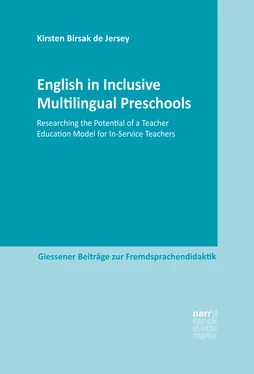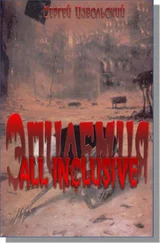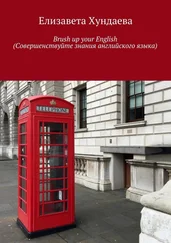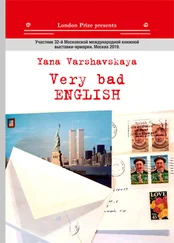Kirsten Birsak de Jersey - English in Inclusive Multilingual Preschools
Здесь есть возможность читать онлайн «Kirsten Birsak de Jersey - English in Inclusive Multilingual Preschools» — ознакомительный отрывок электронной книги совершенно бесплатно, а после прочтения отрывка купить полную версию. В некоторых случаях можно слушать аудио, скачать через торрент в формате fb2 и присутствует краткое содержание. Жанр: unrecognised, на английском языке. Описание произведения, (предисловие) а так же отзывы посетителей доступны на портале библиотеки ЛибКат.
- Название:English in Inclusive Multilingual Preschools
- Автор:
- Жанр:
- Год:неизвестен
- ISBN:нет данных
- Рейтинг книги:3 / 5. Голосов: 1
-
Избранное:Добавить в избранное
- Отзывы:
-
Ваша оценка:
- 60
- 1
- 2
- 3
- 4
- 5
English in Inclusive Multilingual Preschools: краткое содержание, описание и аннотация
Предлагаем к чтению аннотацию, описание, краткое содержание или предисловие (зависит от того, что написал сам автор книги «English in Inclusive Multilingual Preschools»). Если вы не нашли необходимую информацию о книге — напишите в комментариях, мы постараемся отыскать её.
English in Inclusive Multilingual Preschools — читать онлайн ознакомительный отрывок
Ниже представлен текст книги, разбитый по страницам. Система сохранения места последней прочитанной страницы, позволяет с удобством читать онлайн бесплатно книгу «English in Inclusive Multilingual Preschools», без необходимости каждый раз заново искать на чём Вы остановились. Поставьте закладку, и сможете в любой момент перейти на страницу, на которой закончили чтение.
Интервал:
Закладка:
The resulting research questions, the description of the preschool teacher education model and general approach that has been chosen to be able to understand and to reconstruct teachers’ development processes will be in the focus of the next chapter.
5 The preschool teacher education project: researching professional development through an approach of participatory action research
It is the purpose of this study to understand in what way preschool teachers can be educated to teach and to implement English in a regular preschool in an effective and sustainable way and in doing so include all the children who attend the preschool. Regular refers to preschools that do not offer a particular pedagogic approach to enhance the teaching of foreign languages within the preschool routine (for example preschools that subscribe to immersion education). Effective means that there is evidence that the children develop communicative English language competences , that is, the children are able to use English as a tool to do meaningful things with the language. Sustainable means that introducing English is not a burden to either the children or the teachers and can therefore become an integral part of the preschool curriculum. Including all the children means that the children’s participation is not dependent on criteria such as their linguistic competence in German (either as their mother tongue or their second language), their age (whether they are perceived as being too young), their social or intellectual skills or speech difficulties, for example.
Due to the general recognition in applied linguistics that the teaching profession is complex and therefore requires designs of professional development and research approaches that aptly capture this complexity (→ chapter 4), a number of collaborative forms of teacher development and research have emerged in the past and have meanwhile become established approaches (see surveys in Savoie-Zajc & Descamps-Bednarz, 2007; Burns & Richards, 2009; Burns, 2010; Caspari, 2016). While the nature of practitioner – teacher educator – research collaboration in participative research differs, all types of collaborative research have in common that they
advocate doing research ‘with’ rather than ‘on’ practitioners … [and direct research] toward changing practices, since its primary goal is to produce change in a concrete situation … [and the research is] aimed at bringing the world of research and the world of practice closer together and to mediate between these two cultures in order to construct knowledge leading to informed practice. (Savoie-Zajc & Descamps-Bednarz, 2007, p. 578)
Through this approach they “mobilized” practitioners’ practical “pedagogical and didactical knowledge” (p. 578).
This research approach entails bringing together what Lave and Wenger (1991) have termed ‘communities of practice’, within which these researchers and practitioners operate” and in doing so belong “to a group engaged in common practices whose members … construct between themselves a method of acting and thinking about their everyday affairs according to their own constraints and resources. (p. 580)
The term that seemed appropriate to describe the teacher development / research design of my study is participatory action research : action research refers to research that is organised as a cyclic development process which would be required to address and to understand the complexity of concerns of both theory and practice that related to my study, and it would depend on the committed participation both from the teacher educator as an expert preschool practitioner and researcher and participating preschool teachers to sustain the development process. Two general research questions resulted from the purpose and approach of my study:
What teacher education model for introducing English into preschool would develop the teachers’ competences needed to teach EFL effectively and accommodate the complexities of the preschool context at the same time?
What evidence is there that they have successfully developed the competences intended?
With this focus, the teacher development study that is presented here covers all three of the main concepts of professional teacher development that Terhart (2011, pp. 206-210) distinguishes:
1 As seen from a structural theory perspective , teachers’ tasks are complex and inherently contradictory in nature due to contextual conditions. Consequently, professional teachers manage to cope with often contradictory uncertainties in a reflective, competent way.
2 As seen from a competence-oriented perspective , teachers’ required knowledge, skills and motivational disposition needed to teach effectively need to be identified first. This knowledge base must be derived from empirical research evidence. Consequently, teachers are able to act in a professional way if they can build their work on these relevant areas.
3 As seen from a biographical perspective , teachers’ development closely relates to individual teachers’ biographies and professional ideas of self.
The focus of this study is on preschool teachers’ competence development (2) but also considers contextual affordances and constraints (1) and relates teachers’ developments to individual teachers’ biographies and resulting profiles (3).
While chapter 5 will present a survey of the research questions in detail and will focus on the design of the teacher education model, the ensuing chapter 6 will focus on details and issues related to the research approach that participatory action research entails.
5.1 Survey of the research questions structured as multiple case study
The teacher education project is organised in the form of a multiple case study that the research questions are assigned to. The case study comprises three levels: the macro level (the evaluation of the survey of state preschool in the Salzburg area) (→ chapter 3), the meso level (all the participating preschool teachers of the selected preschool that would represent preschool teachers’ joint development as a social community of practice ) (→ chapter 6.2) and the micro level of the case study (the individual participating preschool teacher’s development processes presented at first as separate individual case studies followed by a concluding summary of their experiences) (→ chapter 7) (→ diagram 2; also presented in chapter 6.1 to describe the levels further):
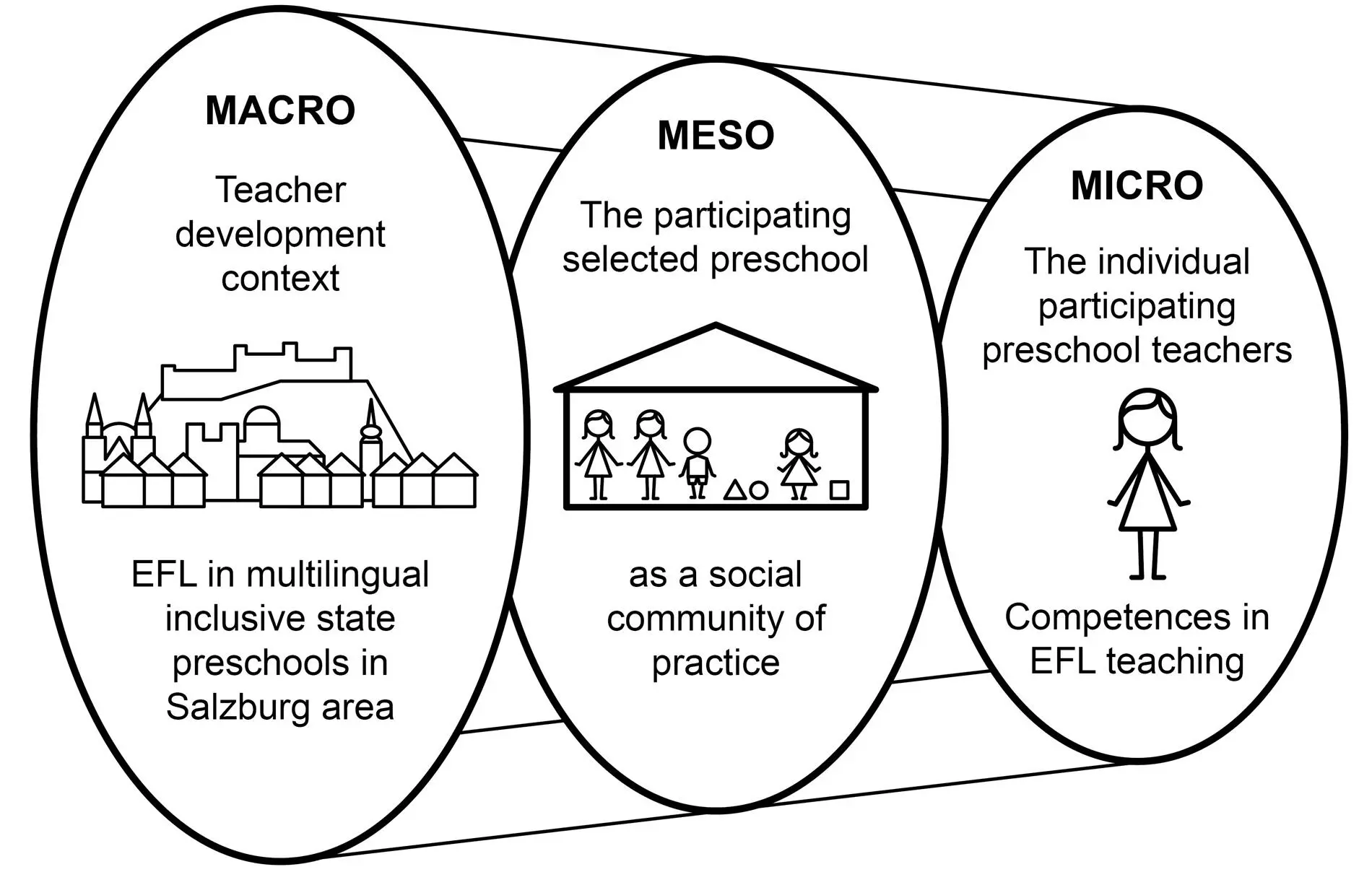 Figure 23:
Figure 23:
Diagram 2: Multiple case study design
The following table (→ table 1) provides a survey of the research questions of my study and relates them to these three case study levels and the corresponding chapters in which the research questions are addressed.
| Research questions and related chapters of the study | |
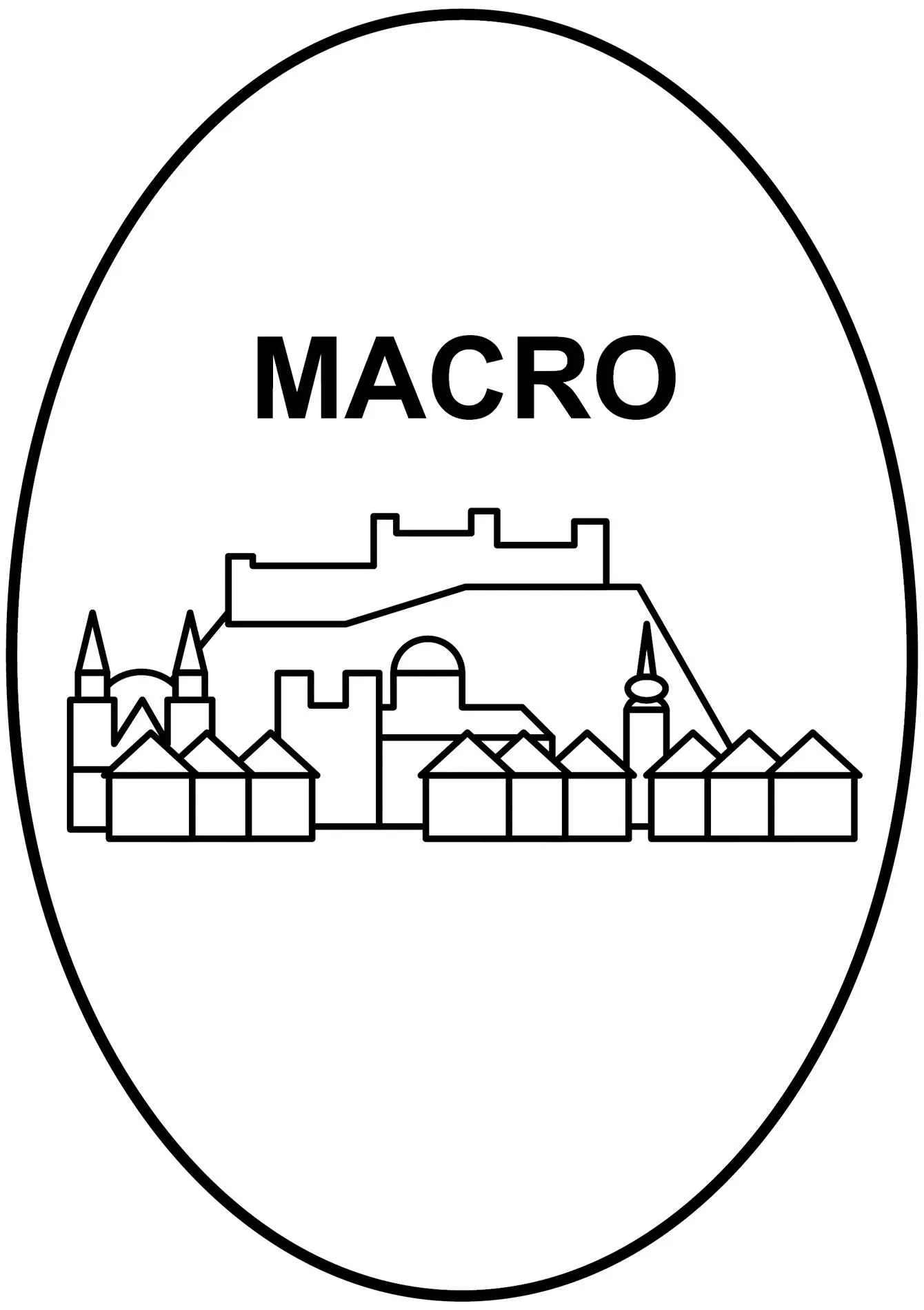 |
MACRO Level Teacher development context EFL in multilingual inclusive state preschools in the Salzburg area(→ chapter 3) |
| 1. Survey of state preschool teachers’ contexts of work (→ chapter 3.2): The size and characteristics of children’s groups (→ chapter 3.2.1): How many groups are in your preschool? (question 1a). How many children are in your group? (question 1b). How many children speak German as their second or third language? (question 1c). State preschools offering German as a second language (→ chapter 3.2.2): Is German taught in your preschool? (question 2a). Who teaches German in your preschool? (question 2a-1). State preschools offering English as a foreign language (→ chapter 3.2.3): Is English offered in your preschool? (question 2b). Who offers it? (question 2b-1). When offered by a visiting teacher, which children take part? (question 2b-2). 2. Preschool teachers’ attitudes towards introducing English in preschool: perspective of the children (→ chapter 3.3): How do you judge learning a foreign language in preschool from the perspective of the children? Rather as an advantage or a disadvantage? (question 3a). There are a number of personal everyday opinions you come across about introducing English in preschool. What is your attitude in the matter? (question 3b). Children should learn German first. (question 3b-1). Introducing English in preschool is a benefit for other languages as well, including German. (question 3b-2). An additional language would burden many children because preschool life is challenging enough for them. (question 3b-3). Children learn a language in a playful way. If a further language (e.g., English) is offered in a child-appropriate way, children will experience that learning languages is fun and consequently they will be relaxed and open for new experiences. (question 3b-4). 3. Preschool teachers’ attitudes towards introducing English in preschool: perspective of the teachers (→ chapter 3.4): From your perspective as preschool teacher, would you consider teaching English rather as a benefit or a burden? (question 4a). Can you imagine offering English yourself in your preschool? (question 4c). Preschool teachers’ education in teaching English: offers and needs (→ chapter 3.4.1): Was the course ‘English in Preschool’ offered during your preservice teacher education? (question 4b). Did you take part? (question 4b-1). Preschool teachers’ communicative English language competence (→ chapter 3.4.2): Do you have the feeling that your English is adequate / not adequate? (question 4c-1). Preschool teachers’ disposition to teacher English to their groups (→ chapter 3.4.3): Would you teach English if appropriate support were provided? (question 4c-2). Logistically accommodating English in the state preschool context (→ chapter 3.4.4): May the reasons (against introducing English in your preschool) be related to the general situation of your preschool, such as coping with daily life in preschool and the logistics of running the morning? (question 4c-3). | |
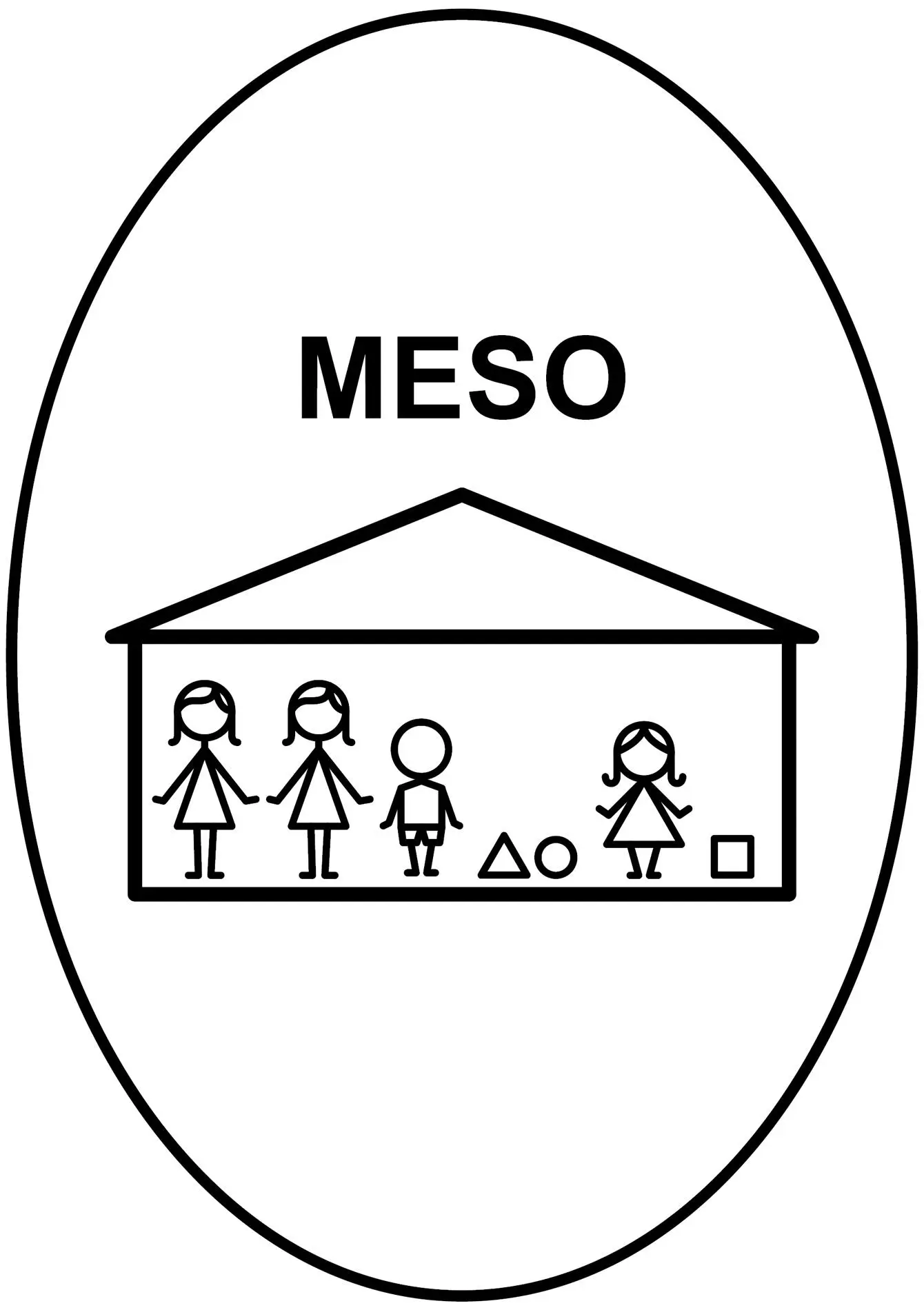 |
MESO Level Teacher development context The participating selected preschool: as a social community of practice Profiles of preschool teachers(→ Chapter 6.2.4) |
| What were the participants’ initial attitudes towards introducing English? What initial experiences (knowledge and skills) did the teachers have in the area of English teaching? What communicative English language competence did participating preschool teachers have? | |
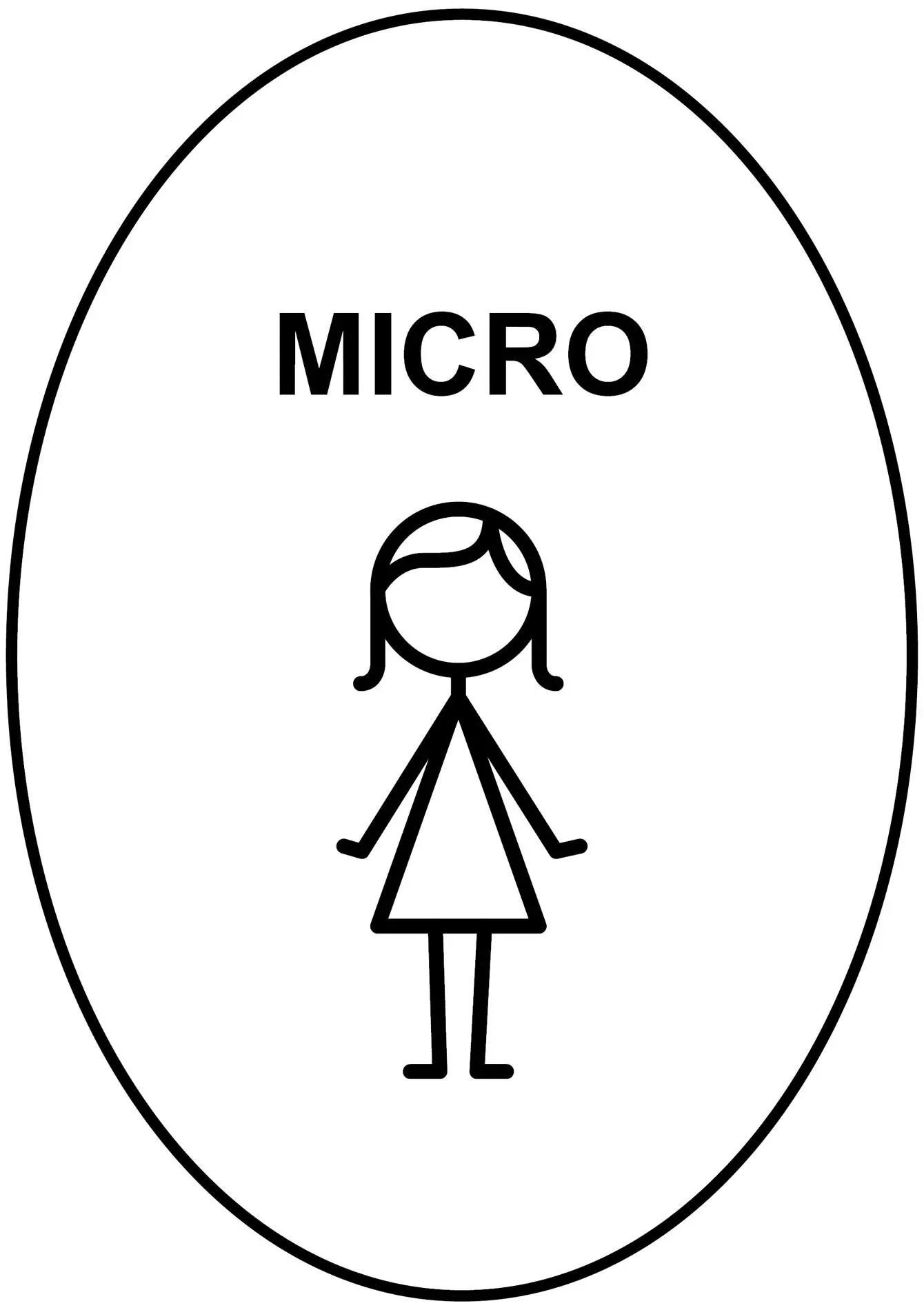 |
MICRO Level The individual participating preschool teachers: individual teachers’ competence development and summary of common experiences(→ chapter 7.2) |
| 1. The teachers’ reassessment of their attitudes towards introducing English (→ chapter 7.2.1): Were the teachers able to reflect on and re-assess their attitudes towards introducing English in their contexts? In what way did the support provided by teacher education assist them in the process of re-assessing their attitudes? 2. The teachers’ motivation to become involved in the teaching process (→ chapter 7.2.2): Did the teacher education engage the teachers in the process to teach English, despite their initial reluctance to introduce it into their groups? What elements of the teacher education contributed to it? 3. The teachers’ developing English teaching competences (→ chapter 7.2.3): Did the teachers gain competences in integrating English tasks into their daily routine in a way that suited their teacher personality? What individual strategies did they develop in this process? Did the teachers gain English teaching competences to create a ‘powerful learning environment for language learning? Did they develop the confidence to use the foreign language in the classroom? 4. The teachers’ reflective practice as professional habit (→ chapter 7.2.4): Were the teachers able to reflect on their English teaching? In what way did the design of the education model support the teachers in this process? Did the teachers become involved in their professional development, by making use of the reflective tools that the teacher education provided? |
Table 1:
Читать дальшеИнтервал:
Закладка:
Похожие книги на «English in Inclusive Multilingual Preschools»
Представляем Вашему вниманию похожие книги на «English in Inclusive Multilingual Preschools» списком для выбора. Мы отобрали схожую по названию и смыслу литературу в надежде предоставить читателям больше вариантов отыскать новые, интересные, ещё непрочитанные произведения.
Обсуждение, отзывы о книге «English in Inclusive Multilingual Preschools» и просто собственные мнения читателей. Оставьте ваши комментарии, напишите, что Вы думаете о произведении, его смысле или главных героях. Укажите что конкретно понравилось, а что нет, и почему Вы так считаете.
